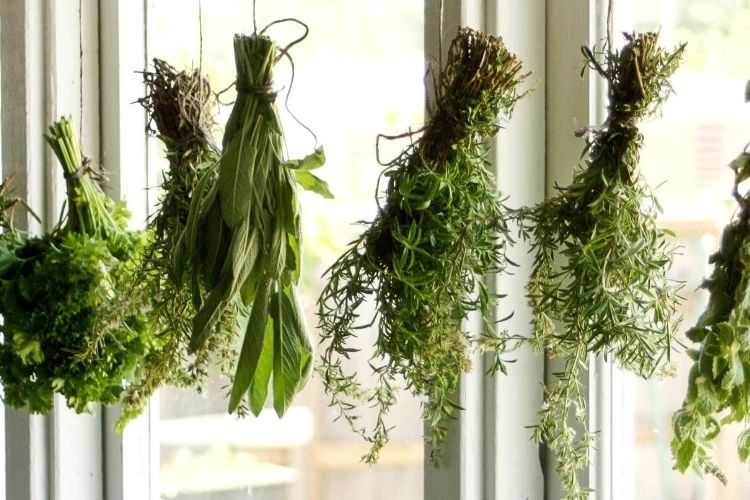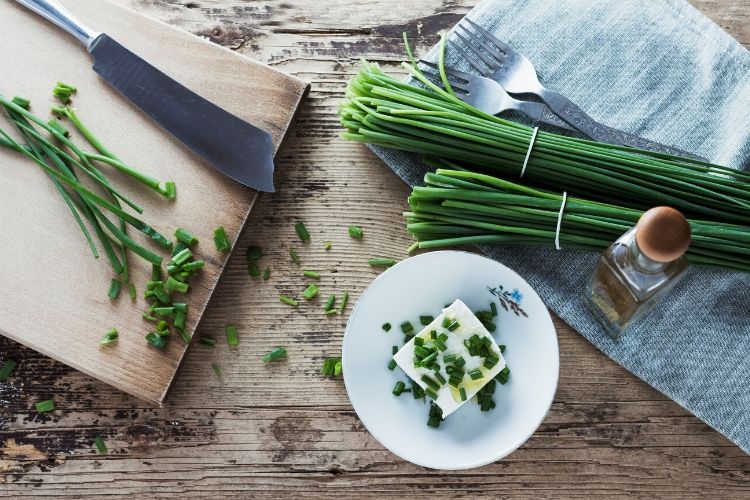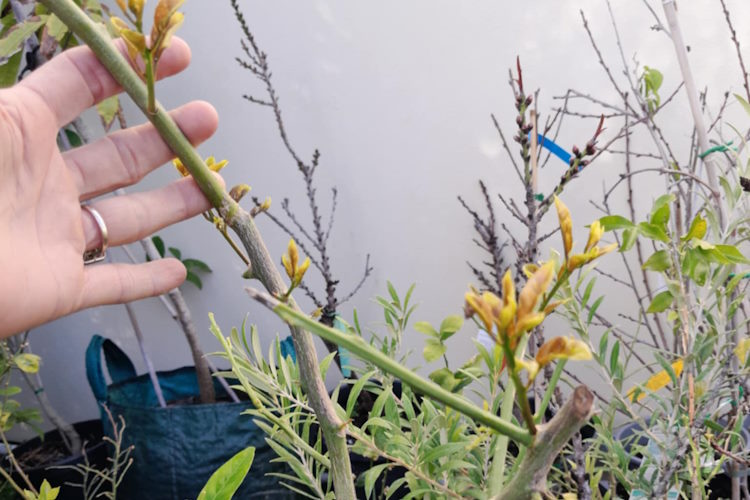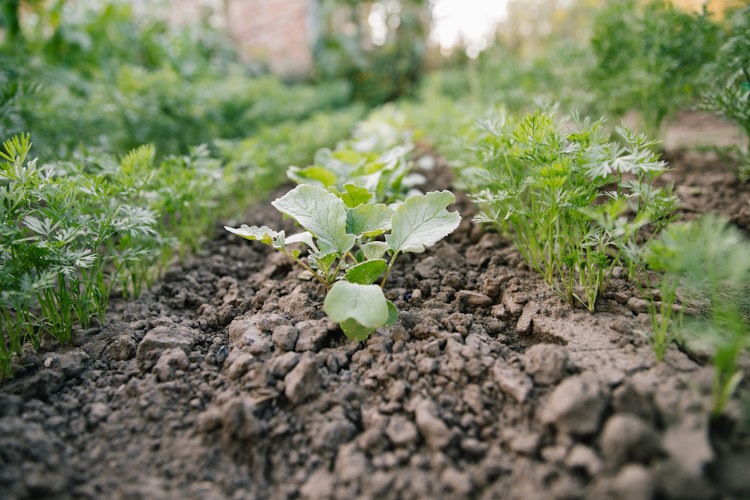Herbs are fast and super easy to grow, as far as ROI (return of investment) the return is very high as herbs are pricey (especially organic). Organic herbs are one of the most expensive fresh additives to purchase from the supermarket, where the quality is very poor and rarely flavorsome. Fresh is always Best!
Here are my top 5 kitchen herbs:
Basil
Will grow for around 10months of the year here in Perth with the exception of mid-late winter. Perennial varieties available. It’s a herb from the mint family and adds flavor to meals and provides health benefits at the same time.
Known benefits:
- Reducing oxidative Stress – basil is a good source of antioxidants which are essential for eliminating free radicals in our body that causes oxidative stress that result in cell damage and disease.
- Supports liver health – antioxidants from Basil have a positive impact on liver health.
- Fights Skin aging – basil has properties that help protect skin from effects of aging. Basil extract in topical creams helps improve skin hydration and reduce roughness and wrinkles.
- Reducing high blood sugar – It was said that an extract from sweet basil can help reduce high blood sugar levels and basil leaves may also help treat long-term effects of high blood sugar and proven useful for people with diabetes.
Growing Basil:
- Choose a pot with a draining hole and lightly moisten your potting mix and pack it firmly.
- Pour some seeds and cover it. Then layer of soil and press gently. Water it gently or use a spray.
- Growing in summer near tomatoes in full/part sun
- For growing over winter ,Place it in a warm window with a bit of sun exposure. As the plants grow, rotate the pots to keep them from leaning in one direction toward the light.
- Check your soil regularly, make sure it’s moist but not soaking wet. If your basil starts to look crowded you may use scissors to cut them out…
- For continuous harvest, plant your seeds every few weeks.
- Cut the flowers off as they appear for extended growth
Rosemary
This is a fragrant evergreen herb usually used as a culinary condiment, to make bodily perfumes and known for its potential health benefits. Best grown in well-draining soil or pot next to your vege patch. Are you excited to know Rosemary’s range of health benefits? Here it is:
- Antioxidants and anti-inflammatory compounds – rosemary is a good source of these compounds that helps boost the immune system and improve blood circulation.
- Enhanced memory and concentration – the aroma from rosemary improves a person’s concentration, performance, speed, accuracy and could even set your mood… try to slightly rub rosemary leaves in your hand and smell it… It’s like magic when you have a bad headache!
- Neurological Protection – rosemary is also good for your brain. It contains an ingredient called carnosic acid, which fights off damage caused by free radicals in the brain. Rosemary is also useful for people who have experienced stroke, this herb may prevent brain damage and improve recovery.
Here are some tips for growing Rosemary in your kitchen:
- Pick the right pot and soil, make sure to pick a pot with a proper drainage.
- Moisten the potting mix and make a tiny hole to put in your rosemary cuttings, add a thin layer of soil and pack it firmly.
- Grow in the garden in full sun and well draining soil, it doesn’t need much love and can grow well in Perth’s famously poor soils
- Water your rosemary every two weeks (if the soil is dry), but always keep the drainage pan with rocks in it. The plant likes to absorb moisture from the air, it enjoys the water as it evaporates from the pan.
Chives
Make a great border or edging plants for the garden and best of all it is a deterrent to pests! Aside from a simple garnish, chives have a lot of potential benefits!
- Helps boost Bone Strength – Vit K is one of this herb’s top benefits. Aside from being it’s blood clotting super power, Vit K is also important for keeping your bones healthy and strong. It improves bone mineral density and reduces the risk of fractures.
- Reduce Inflammation – chives are great for inflammation. The leaves of chive plants help reduce oxidative stress and exhibit anti-inflammatory properties.
- Disease prevention – chives aid the prevention of chronic conditions like heart disease, cancer and diabetes. This herb is rich in organosulfur compounds, quercetin, flavonoids, and saponins which is an effective anti-cancer, preventive cardiovascular and heart disease, and prevention for diabetes.
Growing chives indoor:
- Thrives in full sun (place near window that can offer six to 8 hours of full sunlight)
- When growing chives indoors, put it close to other pots to provide humidity.
- Water your chives when you feel the soil is already dry. Do not over water your chives.
- Growing chives can also be your pest repellent because of its aroma, see how beneficial this could be?
- Chives germinate within two weeks… growing chives near your kitchen makes it easier for you to season your dishes and brighten your space…
Thyme
Thyme is the most superb and versatile herb…Best companion plants for strawberries, deters pest and amazing flavour. Have You tasted a strawberry that grew near thyme? It’s amazing!
Thyme has also gained its reputation for its medicinal qualities, and giving us these benefits:
- Acne treatment – tired of buying over-the-counter medicines for your acne problem? Now you’re lucky! Thyme is known for its antibacterial properties and can be an acne-fighting ingredient…
- Helps lower blood pleasure – an extract from this herb aids is lowering high blood pressure and is also known to lower bad cholesterol… how to do it? Try using thyme as a substitute to your salt.
- Great for cough – Essential oil from thymes leaves is often used as natural cough syrup. Try combining thyme and Ivy leaves to soothe your cough or other symptoms of bronchitis.
- Disinfect your Home – common air pollutants like molds can dangerously hang in your home! Thyme oil can be the solution for low mold concentration for its oil holds many fungicidal properties which can be used as disinfectant! Again, amazing isn’t it?
- Helps you get rid of pests – Pests hate thyme! It can also be used as a mosquito repellant… try rubbing thyme leaves in your hands for instant repellant or you may also make your homemade version by mixing four drops of thyme oil to 1 tsp of olive oil, or mix five drops of thyme oil in two ounces of water.
Now let’s talk about Thyme’s growing condition… it is easy to grow and does better when watered well in a warm, bright location.
- Light: Thymes love the bright light or full sun.
- Water: you water them regularly but do not soak it. Let the soil dry a little bit between waterings… believe me Thymes is naturally drought resistant!
- Soil: use an airy, light and fast draining soil to avoid over moisture.
Parsley
Highly nutritionally dense and aids the absorption of other vitamins particularly Vit C. Also neutralizes bad breath, no after dinner mint required… You can now kiss the night away!
You think that Parsley is only for garnish? It can do much more than just making your plate pretty… here are some unexpected benefits of this herb:
- Protection for Breast Cancer – parsley contains “Apigen”, a chemical compound that is known to help inhibit breast cancer cell growth.
- Fight Inflammation – since Parsley is known to be high in antioxidants and vitamins such as vitamin C, A, and E, it could definitely soothe inflammation, like Arthritis (inflammation of the joint). This herb is also rich in flavonoids that could help reduce the risk of chronic diseases, like cancer, atherosclerosis, Alzheimer’s and Parkinson’s disease.
- Helps with Digestion – parsley is a soothing herb that can help your digestion and reduce bloating. It contains compounds that enable the expulsion of gas from the body.
- Protects your eyes – this herb is a good source of Vit A. adequate intake of this plant ensures the optimal health of your eyes, preventing it from dryness, night blindness and cataracts.
Is parsley easy to grow indoors? Yes it is… Just simply follow these:
- Choose a container with drainage holes, add a soil-less potting mix (garden soil is too heavy to use in a pot), and sow seeds 1 to 2 inches apart, about 1/4 inch deep.
- Place your plant in the brightest area if possible. Try to rotate your pot every now and then to make sure that each part will receive its own supply of light
- Water them regularly but do not overwater it. Let the soil dry a little in between waterings.
Want to grow your own herbs but don’t know how to? Call us now to see how we can help you grow herbs in your own home, Our Perth Gardening experts can help get your Kitchen Garden Set up & Set up right the first time!











